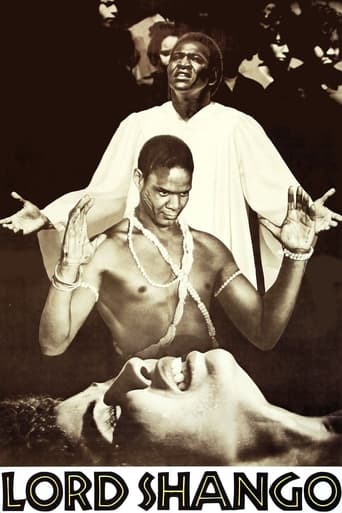John Nail (ascheland)
If you go into "Lord Shango" expecting blaxploitation horror schlock along the lines of "Blacula" or "Sugar Hill," you're going to be disappointed. Once you adjust your expectations, however, you'll be pleasantly surprised.The movie opens with the baptism ceremony of Billie (Avis McCarther), the teen-age daughter of Jenny (Marlene Clark). Interrupting the ceremony is Billie's voodoo-practicing boyfriend. A struggle ensues with the church elders, who attempt to forcibly baptize the boyfriend, "accidentally" drowning him. Jenny doesn't entirely believe the drowning was accidental, even though her boyfriend Memphis (Wally Taylor) is one of the church elders involved. While Jenny is at her waitress job, Billie is seemingly possessed, writhing on her bed and beckoning for Memphis. Yeah, we know where this going, and once Jenny discovers what went on all hell breaks loose. Billie, ashamed, runs away, while Memphis begs for Jenny's and God's forgiveness. God may forgive, but Jenny doesn't, renouncing Christianity in favor of voodoo, using its rituals to find her daughter and get revenge."Lord Shango" actually has a lot in common with "Ganja & Hess," which also starred Clark. Like that movie, "Shango" seems better suited for the art-house than grindhouse. Many of the supernatural elements are implied, and, in some instances, may not be supernatural at all. Fanning the flames is a character named Jabo (Lawrence Cook), the local drunk who may—or may not—be Lord Shango reincarnate. If he has any special power, it's his ability to manipulate by suggesting that some characters face dire consequences, as he does when he plays on Memphis' paranoia, or greater rewards, as he does with Jenny, who seems convinced she knows his "real" identity.But while "Lord Shango" is far more intelligent than one might expect, it doesn't entirely live up to its potential. For starters, this movie often drowns in its own soundtrack, with music—be it gospel, tribal drums, funk, jazz—blaring in practically EVERY scene, whether it's necessary or not. It's frequently difficult to hear the dialog, and there are many times when the music deflates the tension. The movie could also benefit from some tighter editing (you have to sit through an awful lot of gospel singing and voodoo drumming before the story really kicks into gear) and a more satisfying ending. Having raised our expectations, screenwriter Paul Carter Harrison and director Ray Marsh can't quite meet them.It's no "Ganja & Hess," but "Lord Shango" is still worth seeking out. The acting, for the most part, is fairly strong, and the story is pretty compelling, even if it's clumsily told.
maslidukan
Lord Shango (The Color of Love) is a film of the Blaxploitation era of film-making that luckily doesn't quite live up to the banner of the genre. This film feels like an Oscar Micheaux film in color; with an all African American cast, dealing with struggles in a small African American community, relationships between men and women, coping with the Christian religion and an African past, there are even African archetypes, etc. The story is about a young woman, Billie, grieving over her non-Christian/pro African Yoruban religion lover, Femi, being accidentally murdered by members of a local church when he objects and interferes with her Christian baptism ceremony. After she grieves for him, she believes she sees him in the body of her mother, Jeannie's current boyfriend, Memphis. It seems that Memphis is either overcome with the spirit of Femi or by his own lust and he ends up copulating with Billie. Billie runs away and when Jeannie realizes the truth of what happened she kicks Memphis out of her home and life as well as the church that supports him. Jeannie desperately wants her daughter back and through the support of a local drunk/trickster character named Jabo, she goes to the Shango worshipers and gives sacrifice to that effort. When the daughter returns, very pregnant, the two women use sacrifice again to set their worlds right. Billie ends up giving birth, leaving the baby behind and going off to heaven with her dead lover Femi and Jeannie ends up with the baby and with Jabo, who is actually Shango in the flesh. There are a lot more intricate details and twists and supernatural elements, too various to mention here, but the film is an interesting attempt to elevate African Yoruban religion on a equal footing if not higher footing than the Christian religion. Really wonderful gospel singing in it too.
treshon
I just watched this movie last night. This flick (as far as I can find) is only available on VHS - I've got a version with an alternate title "Color Of Love". I have to say that Marlene Clark as "Jenny" gave a very good performance, the most believable in the film. If you are an animal activist, you may be disturbed by some of the rituals performed in the movie - although they insinuate situations, you don't actually see any animals abused....As a person who is not very religious or has an interest in voodoo, the thing that drew me to this movie was the funky music throughout the movie. One scene will have hardcore tribal music at a sacrificing ritual - then cut to a bar scene will an old man movin' to a break in "Funky But"!!! Worth watching for Marlene Clark's performance, and if you like to expand past MGM's Soul Cinema series into the odder flicks around the era...
cfc_can
Lord Shango is a pretty offbeat story of a woman (Marlene Clark) and the relationships between her, her teen daughter and an odd man who may or may not have odd powers. It doesn't always make sense but it is far more intelligent than you would think. The end result though is not overly satisfying. It's nowhere near as exploitational as say, Blacula or Blackenstein but it's also a lot less well known than those two films. It was filmed down south and has a great sense of atmosphere.



